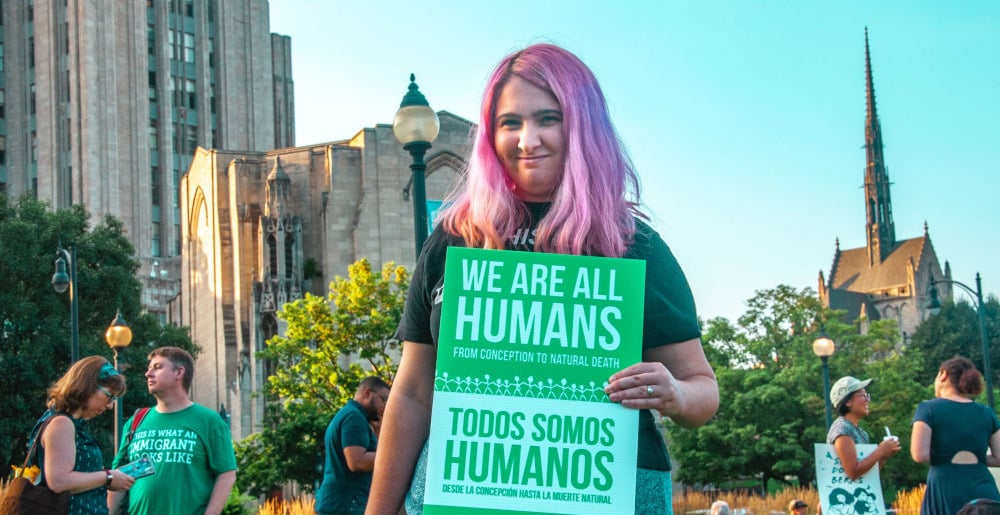Catholic Social Teaching
-
-
“No one can demand that religion should be relegated to the inner sanctum of personal life, without influence on societal and national life, ... An authentic faith – which is never comfortable or completely personal – always involves a deep desire to change the world, to transmit values, to leave this earth somehow better that we found it.” -Pope Francis from Evangelii Gaudium (183)
 In the Gospel of Luke, Jesus tells a story in response to a lawyer’s question, “Who is my neighbor?”. The story is about a victim lying naked and “half-dead” on the side of the road between Jerusalem and Jericho. The story builds as the priest and Levite sidestep the messy and potentially dangerous situation, leaving room for a hero. To the surprise of the crowd, the hero of the story is a (hated) Samaritan.
In the Gospel of Luke, Jesus tells a story in response to a lawyer’s question, “Who is my neighbor?”. The story is about a victim lying naked and “half-dead” on the side of the road between Jerusalem and Jericho. The story builds as the priest and Levite sidestep the messy and potentially dangerous situation, leaving room for a hero. To the surprise of the crowd, the hero of the story is a (hated) Samaritan.For two thousand years, Christians and non-Christians alike have been challenged by the essential message of this parable. In the Parable of the Good Samaritan, Jesus teaches a lesson that takes us all well beyond our comfort zones, as he stretches our idea of “neighbor” to something without limits or boundaries.
And yet, at the core of this lesson, is a profound truth, so central to who we are as Catholics. Like the Samaritan, we are called to recognize the dignity in the other and do what we can to serve and care for those in need.
For two thousand years, the Catholic Church has kept the question regarding what it means to be a “neighbor” at the forefront of our collective conscience. As Catholics, we are blessed by a rich tradition and a treasure of teachings that make up the very Catholic social teaching that informs us and guides us as we answer the very questions posed to us by Jesus himself in the Gospels.
Central to our faith, Catholic social teaching reminds us of our God-given dignity and our obligation to recognize and respect that dignity in every individual, just as the merciful Samaritan did.
The United States Catholic Bishops eloquently state why Catholic social teaching is so fundamental to who we are as followers of Christ:
“Catholic social teaching is based on and inseparable from our understanding of human life and human dignity. Every human being is created in the image of God and redeemed by Jesus Christ, and therefore is invaluable and worthy of respect as a member of the human family. Every person, from the moment of conception to natural death, has inherent dignity and a right to life consistent with that dignity. Human dignity comes from God, not from any human quality or accomplishment." (USCCB)
-
-
-
Below are Seven Principles that describe what we are for as Catholics:
Life and Dignity of the Human Person
The Catholic Church proclaims that human life is sacred and that the dignity of the human person is the foundation of a moral vision for society. This belief is the foundation of all the principles of our social teaching. For more visit HERE.
Call to Family, Community and Participation
The Church teaches that the person is not only sacred but also social. How we organize our society in economics and politics, in law and policy, directly affects human dignity and the capacity of individuals to grow in community. For more visit HERE.
Rights and Responsibilities
The Church also teaches that every person has a fundamental right to life and a right to those things required for human decency. For more visit HERE.
Option for the Poor and Vulnerable
(See Matthew 25: 31-46)
A basic moral test is how our most vulnerable members are faring. In a society marred by deepening divisions between rich and poor… our tradition instructs to put the needs of the poor and vulnerable first. For more visit HERE.
The Dignity of Work and the Rights of Workers
The economy must serve people, not the other way around. Work is more than a way to make a living; it is a form of continuing participation in God’s creation. For more visit HERE.
Solidarity
We are one human family whatever our national, racial, ethnic, economic, and ideological differences. We are our brothers’ and sisters’ keepers, wherever they may be. For more visit HERE.
Care for God’s Creation
We show our respect for the Creator by our stewardship of creation. Care for the earth… is a requirement of our faith. For more visit HERE.
-

